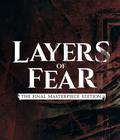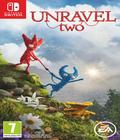Buy Unravel Two
When Unravel Two was first announced, the Nintendo Switch was still in its infancy. That's probably the main reason why Nintendo's hybrid was not blessed with a port of the indie platformer when it was released last summer for all other major systems. Given the title's strong sales performance, it was only a matter of time until publisher EA sanctioned a Switch port, and almost a year later, here we are with Unravel Two for the Switch. There's no doubt that it'll remain a fun experience on the Switch, but the question is how well it performs on the hardware and whether it can find a reasonable balance between gameplay and technical prowess.
As the name suggests, the physics-based puzzle platformer is a sequel to Unravel. In both entries, there's an overarching narrative as we control a little creature made of yarn — appropriately named Yarny — who navigates a variety of levels. The biggest difference is that Unravel Two is completely based on co-op gameplay and its integration of two Yarnies who are connected together with, well, yarn. The story plays out in the background, with very brief cut scenes that give a feeling of what's going on but often fail to have an emotional impact. The first game did a better job with the story, but the gameplay was a bit wonky and imprecise. Unravel Two, on the other hand, isn't as impressive in its emotional impact and storytelling, but it features noticeable improvements in the overall gameplay experience.
The game introduces us to our two protagonists after they get shipwrecked and washed ashore. We then get introduced to the main mechanics and interplay between the two characters. While the game is fundamentally designed to be played with two characters and offers co-op, Unravel Two is equally playable on your own. In order to accommodate this, we are always able to let one Yarny carry the other one which effectively merges them together. This makes navigating the stages outside of situations where both Yarnies are required a lot more convenient in singleplayer. Being a puzzle platformer, the basic move set is given. Jumping and wall-jumping as well as pushing objects are the 101 of navigating this world. The fact that our actual protagonists are completely made of yarn (and always connected by a string) opens up an extra set of moves and possibilities.
When in range of certain anchor points, we can extend a string and swing over gaps or propel ourselves to higher ground. If one Yarny is higher up than the other, they can serve as an anchor point for the other. Connecting to your yarn buddy also offers the option to rappel up and down objects, as long as the other character serves as a counterweight on the other end. In addition to basic mountaineering, we can also tie knots to build a yarn ramp (to push objects over) and a trampoline line (to jump higher). Many of the moves were present in the previous Unravel, but having to leverage and coordinate them with an additional character opens up some truly interesting situations.
Again, the adventure can be played solo (which we mostly did for the review), but the real fun starts when a second human player participates. Like every other game of its kind, it stands and falls on the way it combines level design and gameplay mechanics in a way that makes sense. Throughout its seven main stages, Unravel Two presents some very clever platforming sections and puzzles that are genuinely fun to figure out, whether you're playing solo or with another person at our side. If you have a buddy, it's arguably more fun to coordinate and solve a situation in tandem, but it's still fun to solve it on your own and swap back and forth between the two Yarnies. The level design is slightly challenging but not overly difficult or unfair. You have to stop, think and give it a few tries, but you'll never get truly stuck.
For additional difficulty, Unravel Two includes 20 additional challenges that consist of self-contained platforming and puzzle sections that can get much more intense than the main stages and pose more of a challenge. It mostly consists of platforming and puzzles. There are no traditional enemies that may pose a threat except some environmental hazards, some angry animals, and a few toxic shadows that need to be avoided. The title uses them to change up the pace, from a slow and thoughtful puzzler to a more energetic platformer, and that change generally works in the game's favor.
Thankfully, Unravel Two is also exciting to play. Physics-based platformers often suffer from floaty or imprecise controls that make traversal tedious. Unravel Two manages to almost always be spot-on, which makes the moment-to-moment gameplay especially satisfying. It's a joy to play when we complete a section of well-timed swings and jumps or when we hit the correct button in time. Even though physics can be inherently weird, Unravel Two is predictable enough to nail a landing after a jump or swing without too much effort. The weight and feel make sense, and so does the platforming.
A big part of Unravel Two's fun and atmosphere comes from its visual representation. The little yarn balls, which are basically the size of mice, navigate a realistically scaled world over rooftops, urban neighborhoods, forest fires, and heavy machinery. While it doesn't look as good as it does on the other consoles, Unravel Two on the Switch mostly strikes a happy medium between visuals and performance. It even has a performance and quality mode when you play in docked mode, so you can choose to prioritize the resolution or frame rate. Handheld mode profits from the small screen and lower resolution, so it generally looks fair, but docked mode reveals quite a few rough edges and poor quality. This also fluctuates based on the levels, so the inconsistency makes it obvious that quite a few concessions had to be made to get Unravel Two to run on Switch. It runs, though, and there's rarely an impact to the frame rate, no matter which mode you choose.
The stages are still positively beautiful. Some stages are packed with an extraordinary amount of detail, and the busy backgrounds make the world feel alive. There are exceptions to this, and Unravel Two won't go down as the prettiest or most efficient port, but it completely retains its original charm and gameplay.
It also isn't the longest game; it consists of seven levels, with each level rarely taking longer than a half-hour, and there are also the 20 bite-sized challenges. There are a few collectible sparks in the levels in case you want to reach 100% completion. It is fun throughout, but the game is over as quickly as it began. That means it neither overstays its welcome nor provides a lot of replayability. What's here is beautiful and fun, and it's one of the better cooperative experiences on the Switch at the moment.
Unravel Two improves upon its predecessor and has a decent showing on the Switch. The gameplay is as fun and clever as it has ever been, making it one of the best cooperative (and mobile) experiences money can currently buy on the Switch, even though the technical downgrade to make it feasible is noticeable throughout. If you aren't bothered by that, be sure to check out Unravel Two.
Score: 8.4/10
More articles about Unravel 2













 Unravel 2 is a side-scrolling platformer in which players control a pair of fantastical creatures called Yarnys as they navigate environments.
Unravel 2 is a side-scrolling platformer in which players control a pair of fantastical creatures called Yarnys as they navigate environments.





























